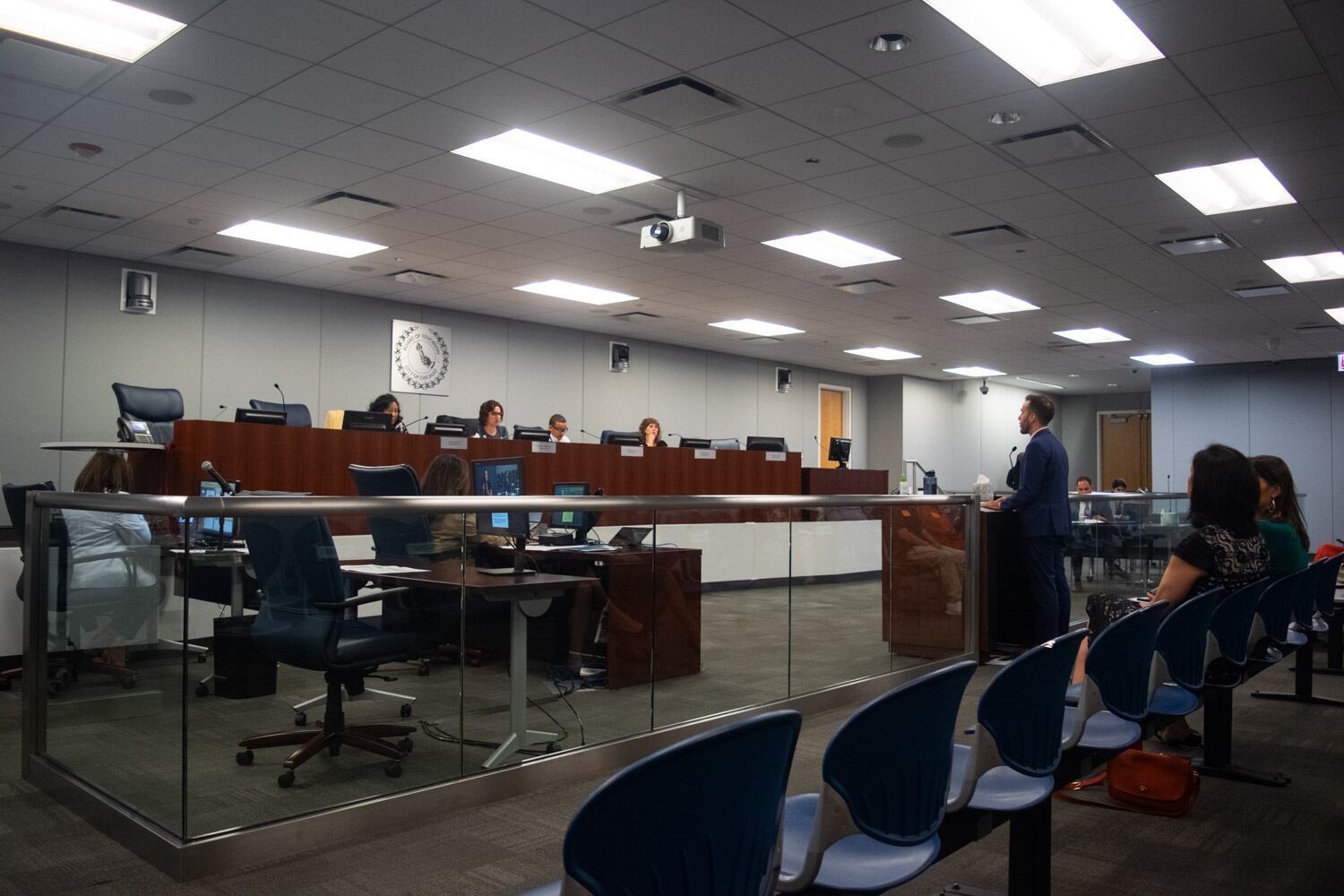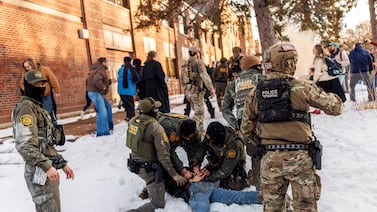Sign up for Chalkbeat Chicago’s free daily newsletter to keep up with the latest education news.
The super PAC of the Illinois Network of Charter Schools poured more than half a million dollars into Chicago’s school board elections in the past week, nearly doubling the total money flowing into these historic races so far.
The influx of cash also lifted the limits on campaign contributions to candidates in certain districts, according to state campaign finance reports.
In what the charter advocacy group has described as an effort to counter the influence of the Chicago Teachers Union and a shift away from school choice in Chicago, the money will pay for digital ads and mailers supporting seven candidates and opposing one. In all, 35 people are running across 10 electoral districts in the Nov. 5 school board election, Chicago’s first after decades of mayor-appointed boards.
The nearly $557,000 spent by INCS Action Independent Expenditure Committee is a significant amount in the city’s historic school board elections, which as of mid-September had seen more than $650,000 flow into campaign coffers of candidates.
The wave of expenditures puts the charter advocacy group at the top of all special interest groups spending in Chicago’s first school board elections — more than double the $238,000 spent by the political action committees of the Chicago Teachers Union and a CTU-led coalition of community organizations.
The union was quick to take aim at the spending, which it described as an effort by rich out-of-towners to buy board seats. Hilario Dominguez, a political coordinator for the union, said the influx of dollars from the charter group was not surprising.
“We anticipated that we were going to be outspent by charter school groups as well as billionaires, minimum of three to one,” Dominguez said.
Andrew Broy, the executive director of the Illinois Network of Charter Schools, said the group is backing candidates who are supportive of charter schools, school choice, and fiscal stability in the district — and who have a likely path to victory in November. The group’s independent expenditures committee, which is fueled mostly by large donations from a handful of billionaires, will report another significant spend in the coming week, he said, though the amount and beneficiaries have not been finalized.
“The question is do these candidates running for school board support the concept that parents should have a choice of where to send their kids to school,” he said.
In recent years, school board races in cities such as Denver, where $1.9 million was raised for three open seats in 2023, and Los Angeles have seen special interest groups pump significant dollar amounts to influence the outcomes, with national teachers unions going against supporters of charter schools and school choice.
In addition to the 10 candidates Chicago voters will elect this fall, the mayor will appoint another 11, as part of a transition to a fully elected school board by 2026.
Latest spending does away with campaign cash caps
Candidates running for office in Illinois are bound by Illinois State Board of Elections limits on how much they can raise, such as $6,900 from an individual contributor, $13,700 from a corporation or a labor union, and $68,500 from another candidate for office or political action committee.
However, so-called super PACs, such as the charter network’s independent expenditure committee, face no limits on how much they can raise and spend in a race in support or opposition of candidates, as long as they are not coordinating this spending with candidates’ own campaigns. And as soon as the collective spending of these super PACs exceeds $100,000 — either to back or oppose a candidate in a certain district — the campaign contribution caps for all candidates in that district are lifted.
“To make it a fair playing field, limits are lifted so that candidates who are not supported by that particular spending can raise any amount as well,” said Matt Dietrich, a spokesman for the Illinois State Board of Elections.
Though the INCS Independent Expenditure Committee cannot legally coordinate with candidates, it will spend the following amounts to support or oppose the following candidates:
- $40,000 for digital media supporting Michelle Pierre, District 1
- $60,000 for digital media and $30,990 for mailers supporting Carlos Rivas Jr., District 3
- $30,000 for digital media opposing Karen Zaccor, District 4
- $40,000 for digital media and $36,416 for mailers supporting Andre Smith, District 6
- $30,000 for digital media and $22,326 for mailers supporting Eva Villalobos, District 7
- $40,000 for digital media and $27,290 for mailers supporting Angel Gutierrez, District 8
- $60,000 for digital media and $41,484 for mailers supporting Miquel Lewis, District 9
- $60,000 for digital media and $38,468 for mailers supporting Karin Norington-Reaves, District 10
This spending resulted in lifting campaign contribution caps in Districts 3, 9, and 10. In some cases, such as District 10, the total spending from the charter network’s super PAC did not exceed $100,000, but it did once added together with another super PAC.
The other super PAC spending in Chicago school board races is Urban Center Action. It is run by Juan Rangel, the former head of the UNO charter network, now named Acero, and a former strategy director with Empower Illinois, one of the state’s top scholarship-granting organizations under the now-sunset tax-credit scholarship program. It is also affiliated with Paul Vallas, the former Chicago Public Schools CEO who lost the 2023 Chicago mayoral race to Johnson.
Urban Center also has a political action committee it created in April that has contributed to at least one school board candidate directly – Eva Villalobos. In all, the two committees have spent $123,000 on Chicago school board races since June.
The Illinois Network of Charter Schools’ super PAC reported $2.8 million in its coffers as of June 30. Since then, three billionaires donated six-figure sums: Helen Zell, wife of real estate tycoon and former Tribune Media owner Sam Zell, gave $500,000 in early September, while Netflix co-founder and chairman Reed Hastings and private investor Craig Duchossois each gave $100,000 in July and September, respectively. Previous donors to INCS Super PAC include former Wheels Inc. CEO James S. Franks and billionaire Jim Walton, the youngest son of Walmart founder Sam Walton.
Candidates weigh in on charter advocate spending
In addition to spending to support candidates in most school board districts, the Illinois Network of Charter Schools’ super PAC also spent to oppose one would-be board member: former teacher Karen Zaccor, the CTU-backed candidate in District 4.
“The fact that they are targeting the one retired teacher is, I think, just another indication of their agenda to destroy public unions in schools and push the privatization agenda.” Dominguez, with the CTU, said.
Broy of the charter network declined to discuss the group’s campaign strategy, but said it has spent in opposition of candidates to help its preferred contenders in political races before.
Angel Gutierrez, the INCS-backed candidate in District 8, said the idea that he is part of a scheme to privatize schools in Chicago is untrue. He said he has vowed to respect two moratoriums currently in place in the city: one the school board approved last month against closing any schools for four years and another against opening new charter campuses, which are public schools managed by private entities.
He said the CTU’s own candidates are receiving financial, in-kind, and volunteer support — and argued he is a pro-labor candidate who believes the city should keep investing in high-performing magnet, selective enrollment, and charter schools.
“The CTU is really nervous because you are starting to see a coalition coalesce — people who don’t always see eye to eye politically, but who love this city and are adamant that the CTU and their mayor don’t gain any more power,” Gutierrez said. “The CTU is trying to hire their next boss so that the board will give them anything they want, no questions asked.”
Like Gutierrez, two other INCS-backed candidates – Carlos Rivas and Miguel Lewis – said in separate statements they did not know much about the spending on their behalf and the upcoming ads and mailers supporting them. They both said they are concerned about limits on school choice and the possibility of taking out a short-term loan to close the district’s budget deficit under Johnson.
“The mayor and his candidates are trying to limit educational opportunities for kids that look like us and bankrupt their future with high-interest loans,” Rivas said in his statement.
Zaccor, the District 4 candidate the charter network is spending to oppose, said she was not surprised by these expenditures. She said her priority as a candidate is advocating for under-resourced neighborhood schools, campuses she said lost students and funding amid the city’s charter school expansion in the 2000s. She said she hasn’t yet seen any ads or mailers opposing her campaign, but she stressed she is against closing any schools, including any charters.
“I am the one candidate in this district that’s clearly standing up for public education and clearly opposes privatization,” she said. “They are working to buy seats while we’re working with grassroots groups.”
Candidates and political action committees are due to report all money raised and spent between June 30 and Sept. 30 by Oct. 15
Mila Koumpilova is Chalkbeat Chicago’s senior reporter covering Chicago Public Schools. Contact Mila at mkoumpilova@chalkbeat.org.
Becky Vevea is the bureau chief for Chalkbeat Chicago. Contact Becky at bvevea@chalkbeat.org.






